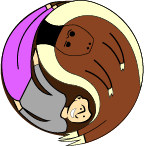the short of it:
Demanding people live makes them forget they’re going to die.

75. The Mischief of Avarice.
The people suffer from famine by reason of exorbitant taxation. This is the cause of famine. The people are difficult to govern, because their superiors make so much ado. This is the reason of the difficulty. The people make light of death, because they seek to live in wealth. This is the reason of their making light of death.
But only [those] who [take] no measures whatever for life is above all this selfishness (is superior to [those] who highly [esteem] life).
75. ‘How Greediness Injures.’
75.1 The people suffer from famine because of the multitude of taxes consumed by their superiors. It is through this that they suffer famine.
75.2 The people are difficult to govern because of the (excessive) agency of their superiors (in governing them). It is through this that they are difficult to govern.
75.3 The people make light of dying because of the greatness of their labours in seeking for the means of living. It is this which makes them think light of dying. Thus it is that to leave the subject of living altogether out of view is better than to set a high value on it.
75. Harmed Through Greed.
75.1 The people hunger because their superiors consume too many taxes; therefore they hunger. The people are difficult to govern because their superiors are too meddlesome; therefore they are difficult to govern. The people make light of death on account of the intensity of their clinging to life; therefore they make light of death.
75.2 [Those] who [are] not bent on life [are] worthier than [those] who [esteem] life.

the death chapters (Part 3):
The paradox of Chapter 75 is easy and obvious. When governments are hard on people, the people become hard.
However, there is more to it than this.
So far Lao Tsu has told us to have compassion for everyone because we are all going to die (Chapter 73). And be very careful who we execute (if any at all), because mimicking nature with institutionalized death is equivalent to cutting our own fingers off (Chapter 74).
Chapter 75 tells us that those who cling too hard to life are the first to die. And governments which overtax and over-police the people are inadvertently forcing people to do just that.
“This chapter continues the idea that forcing life and trying to get too much out of it is as bad as squandering it” (Ames 195). And when do people try to get too much out of life? When their governments demand it.
The overall paradox Lao Tsu builds in his Death Chapters is inescapable. Governments that overtax and over-police the people ignore the fact that we are all going to die someday (Chapter 73). The people work hard to pay those taxes and live within whatever narrow scope of law exists, but they have to ignore the immanence of death to do it (Chapter 75).
And that’s when the paradox kicks in. People who aren’t afraid of death cannot be ruled by threat of death (Chapter 74). People then become appropriately, increasingly un-rulable.
-TB
